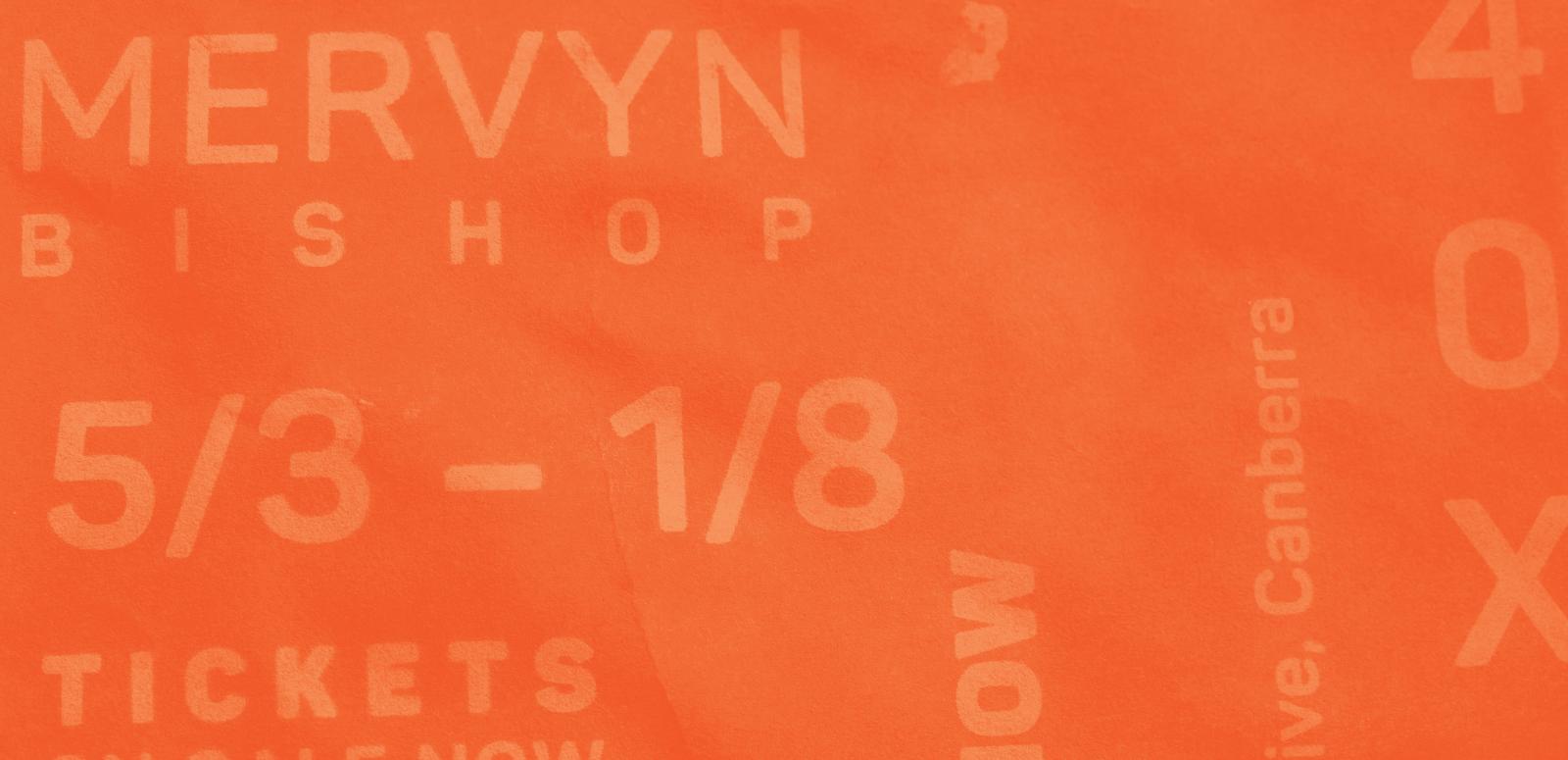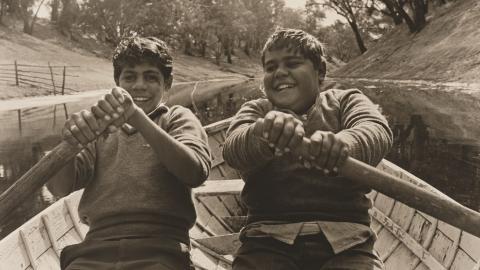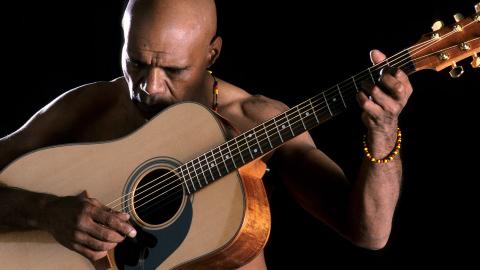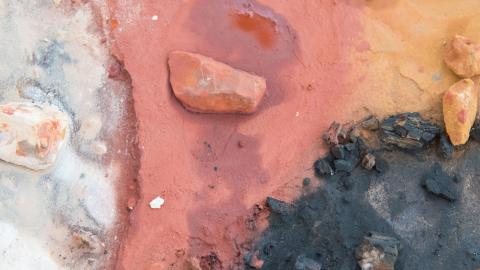

Oodgeroo Noonuccal: The Dawn Is At Hand
Oodgeroo Noonuccal: The Dawn Is At Hand
WARNING: this page contains the names of deceased Aboriginal and Torres Strait Islander people.
This is a transcript from an audio recording of The Dawn Is at Hand (1989) in which Oodgeroo Noonuccal speaks of her early childhood on Stradbroke Island, describes how her interest in nature led her to creative writing and then recites several of her poems including ‘Corroboree’, ‘Ballad of the Totems’, ‘Dawn Wail For the Dead’ and ‘We Are Going’.
The Dawn Is at Hand (excerpt)
Oodgeroo Noonuccal:
I am of Aboriginal descent. I am classed as a poet. I was born on 3 November 1920. I spent my childhood on Stradbroke Island. I am of the Noonuccal tribe of Stradbroke Island. I was a child who preferred to communicate with nature rather than my fellow man. I never made friends easily with my schoolmates. I preferred to be alone and spent much time investigating the beauty of nature.
My love of nature and my constant communication with her gave me time to study the struggle man was enduring and why man was enduring the struggle. I realised that man had lost his balance with nature and wondered whether I could help him find that balance. In my own Aboriginal world, I lived by the balance of nature. I learned early to realise that man had substituted the balance of nature for material and commercialised gain. Man had found a new false god who, in his vanity, tried to outsmart nature and in so doing lost himself in the process.
In studying nature, the exercise was to lead me to the written word for I longed to communicate with my fellow man. I found myself searching for words to express my feelings. Even at school, I was lost. I was classed as a child with crazy ideas, not to be taken seriously. With my pen and paper, I withdrew to a world of my own. The world I found had tranquility, peace, tolerance and understanding; in fact, all the emotions necessary for man to live in harmony with his fellow man. Through my poetry, I hope to enlighten or educate the lost man. It was inevitable that my poem should come plain and natural.
Ever aware of nature, ever aware of the balance of all elements, I found myself a very lonely person. Even my schoolmates classed me as a rather odd, uncivilised, half-wild, born to be and stay [inaudible] to the end. It was firmly believed by Aborigines and non-Aborigines that I was a lost cause and that no matter how much the so-called superior white race did, they were wasting their time on me.
My loneliness was however balanced by nature herself, who allowed me to enter her realm and in so doing became my greatest teacher. She taught me the reason for rain, floods, storms and why it was necessary to uproot the beautiful trees she had herself created; why at times she could be peaceful, calm and beautiful and at times be angry and violent. She taught me much about the sea, taught me not to fear it, but at all times to respect it. I saw the sea at times as a mature woman crooning to her children, and there were times when I saw her as a violent, angry, hungry woman, grasping at all and everything within her grasp. Nature slowly but surely drew me into her realm of understanding. In view of all this, it was inevitable that my poetry would be spliced with all the emotions of sorrow, pain, tolerance, love, peace, happiness and hope.
Speaker 1:
For nine years, from 1961, Oodgeroo Noonuccal was state secretary of the Federal Council for the Advancement of Aboriginal and Torres Strait Islanders. And also for the same period, she was on the executive of the Queensland Aboriginal Advancement League. She has been the recipient of many awards, including the Mary Gilmore Medal and Fellowship of Australian Writers' Award.
Since 1972, Oodgeroo has run Moongalba, an educational and cultural centre on Queensland's North Stradbroke Island, the traditional home of the Noonuccal tribe. There, she educates black and white people in the history and culture of her people. For example, her explanation of a corroboree.
Oodgeroo Noonuccal:
To give an explanation about why Aborigines did their corroborees every night, it was no vanity thing. And I read this for that reason, to explain it to the young people, especially those in schools. Our corroboree was our way of involving everyone in the hunt. When the young men went out after the hunt, they had to leave the oldies at home and the very young at home. When they came home with a kangaroo, after they had eaten the kangaroo, then they would re-enact the day's hunting so that the oldies and the youngies would be involved in the whole hunt. So, that's what corroboree is all about.
Corroboree
Hot day dies, cook time come.
Now between the sunset and the sleep-time
Time of playabout.
The hunters paint black bodies
by firelight with designs of meaning
To dance corroboree.
Now didgeridoo compels with
haunting drone eager feet to stamp,
Click-sticks click in rhythm to swaying bodies
Dancing corroboree.
Like spirit things in from
the great surrounding dark
Ghost-gums dimly stand at the edge of light
Watching corroboree.
Eerie the scene in leaping firelight,
Eerie the sounds in that wild setting,
As naked dancers weave stories of the tribe
Into corroboree.
Oodgeroo Noonuccal:
And now, our good spirit, Biami. When you see the sun rise in the morning, what the Aborigines see is Biami lighting his breakfast fire, calling us to get out of bed, light our fire, do the same because there's work to be done. And as he goes from east to west, we travel on the earth from east to west with him, working our way towards the west. When we see him, his bright skies lit up by all his fire, it's our time to stop work, put down our tools, and start our evening meal so that we can eat with the good spirit, Biami.
'Mother, what is that one sea, sometimes blue or green or yellow?' – 'That Biami's waterhole. He big fellow.'
'Mother, what makes sunset fire, every night the big red glare?' – 'Biami's gunya out that way, that his campfire over there.'
'How come great wide river here, where we swim and fish with spear?' – 'Biami dug him. You see big hills all about? They the stuff that he chuck out.'
Oodgeroo Noonuccal:
The poem called the 'Ballad of the Totems' is a true story. We did have this snake in our place. He caught our frogs and mice in the ceiling, et cetera. And we lived with him. The last part of this poem is made up by me because when my father died, he did disappear. And so, I've got a fair idea this is what happened. And the last part of this poem tells you what I think happened to the carpet snake. And by the way, the carpet snake is my totem.
Ballad of the Totems
My father was Noonuccal man and
kept old tribal way,
His totem was the Carpet Snake,
whom none must ever slay;
But mother was of Peewee clan,
and loudly she expressed
The daring view that carpet snakes
were nothing but a pest.
Now one lived right inside with us
in full immunity,
For no one dared to interfere
with father's stern decree:
A mighty fellow ten feet long,
and as we lay in bed
We kids could watch him round a beam
not far above our head.
Only the dog was scared of him,
we'd hear its whines and growls,
But mother fiercely hated him
because he took her fowls.
You should have heard her diatribes
that flowed in angry torrents
With words you never see in print,
except in DH Lawrence.
'I kill that robber,' she would scream,
fierce as a spotted cat;
'You see that bulge inside of him?
My speckly hen make that!'
But father's loud and strict command
made even mother quake;
I think he'd sooner kill a man
than kill a carpet snake.
That reptile was a greedy-guts,
and as each bulge digested
He'd come down on the hunt at night
as appetite suggested.
We heard his stealthy slithering sound
across the earthen floor,
While the dog gave a startled yelp
and bolted out the door.
Then over in the chicken-yard
hysterical fowls gave tongue,
Loud frantic squawks accompanied by
the barking of the mung,
Until at last the racket passed,
and then to solve the riddle,
Next morning he was back up there
with a new bulge in his middle.
When father died we wailed and cried,
our grief was deep and sore;
And strange to say from that sad day
the snake was seen no more.
The wise old men explained to us:
'It was his tribal brother,
And that is why it done a guy' –
but some looked hard at mother.
She seemed to have a secret smile,
her eyes were smug and wary,
She looked as innocent as the cat
that ate the pet canary.
We never knew, but anyhow
(to end this tragic rhyme)
I think we all had snake for tea
one day about that time.
Speaker 1:
And from The Dawn Is at Hand, Oodgeroo Noonuccal recites two of her poems, 'Dawn Wail for the Dead' and 'We Are Going'.
And following that, we have an interview with Malcolm Williamson, who begins by telling us when he started The Dawn Is at Hand.
Oodgeroo Noonuccal:
Unlike those in the invading field, in the Aboriginal world, we mourn our dead every day of every week of every month of every year. Matter of fact, some of the tribes will not start the day unless they first wail for the dead. But even as we wail for the dead, we know we have a responsibility to the living. So, after we've wailed for the dead, we go about the business of looking after the living. And what I've tried to do in capturing the wail – the best way I can explain it is if you can imagine that I've tried to capture our type of 'Last Post'.
Dawn Wail for the Dead
Dim light of daybreak now
Faintly over the sleeping camp.
Old lubra first to wake remembers:
First thing every dawn
Remember the dead, cry for them.
Softly at first her wail begins,
One by one as they wake and hear
Join in the cry, and the whole camp
Wails for the dead, the poor dead
Gone from here to the Dark Place:
They are remembered.
Then it is over, life now,
Fires lit, laughter now,
And a new day calling.
We Are Going
They came into the little town
A semi-naked band subdued and silent,
All that remained of their tribe.
They came here to the place
of their old bora ground
Where now the many white men
hurry about like ants.
Notice of estate agents read:
'Rubbish May Be Tipped Here'.
Now it half covers the traces of the old bora ring.
They sit and are confused,
they cannot say their thoughts:
'We are as strangers here now,
but the white tribe are the strangers.
We belong here, we are of the old ways.
We are the corroboree and the bora ground,
We are the old sacred ceremonies,
the laws of the elders.
We are the wonder tales of Dream Time,
the tribal legends told.
We are the past, the hunts and the laughing
games,
the wandering camp fires.
We are the lightening-bolt over Gaphembah Hill
Quick and terrible,
And the Thunder after him, that loud fellow.
We are the quiet daybreak paling the dark lagoon.
We are the shadow-ghosts creeping back as the
camp fires burn low.
We are nature and the past, all the old ways
Gone now and scattered.
The scrubs are gone, the hunting and the laughter.
The eagle is gone, the emu and the kangaroo are
gone from this place.
The bora ring is gone.
The corroboree is gone.
And we are going.
The National Film and Sound Archive of Australia acknowledges Australia’s Aboriginal and Torres Strait Islander peoples as the Traditional Custodians of the land on which we work and live and gives respect to their Elders both past and present.


